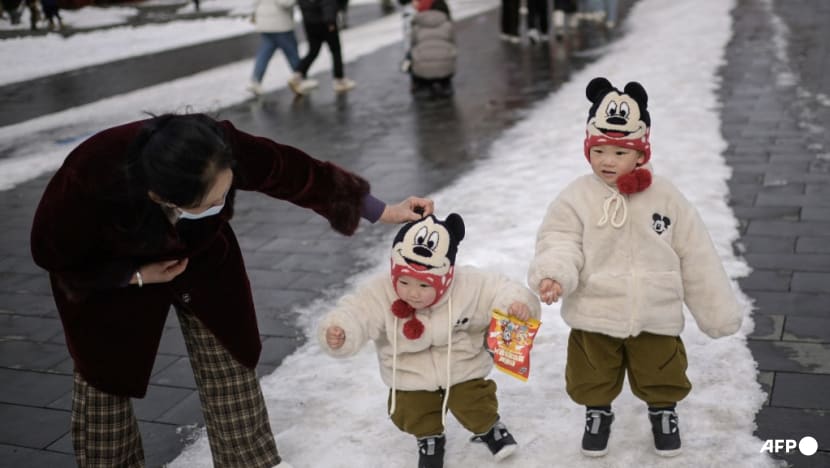Analysis: China is one of the costliest places to raise a child, and it’s not all about the money
China is the world’s second-most expensive country to raise a child, relative to its GDP per capita, according to a prominent Chinese think tank. Beyond the financial pinch, there’s also a hefty price paid in time and opportunity cost, say analysts.

Children visit the Forbidden City in Beijing, China on Feb 21, 2024. (Photo: AFP/Pedro Pardo)

This audio is generated by an AI tool.
SINGAPORE: Spending on education is a critical contributing factor to the high cost of raising a child in China, especially with it still being seen as a key pathway to success, observers are pointing out in the wake of a recent report laying bare the financial reality of parenting in the country.
The report late last month by a Chinese think tank stated that the cost of raising a child in China till the age of 18 is “almost the highest in the world” relative to its GDP per capita.
“China has been experiencing rapid fertility decline. With fewer children, parents tend to concentrate more resources on raising and educating the next generation,” said Dr Zhao Litao, senior research fellow at the National University of Singapore’s (NUS) East Asian Institute.
But the costs go beyond money as well, with a hefty toll exacted on parents in terms of time spent and the opportunity cost, analysts note. They add that this is particularly pronounced for mothers, due to prevailing gender norms in China.
While local governments are providing varying degrees of support, experts believe what will truly move the needle is a mindset shift by businesses and people on parental roles and the definition of success.
THE PRICE OF PARENTING
The report by YuWa Population Research Institute stated that the national average to raise a child in China till the age of 18 is about 538,000 yuan (US$74,600). This includes nanny and childcare fees, money spent on school and educational materials as well as extracurricular activity fees.
That’s around 6.3 times the country’s per capita GDP and “almost the highest in the world”, the report said.
Also highlighted - how China’s rate exceeds other countries such as neighbouring Japan (4.26 times), the United States (4.11 times), France (2.24 times) and Australia (2.08 times). South Korea claimed the top spot, with the cost coming in at 7.79 times the country’s GDP per capita.
Beijing and Shanghai remain the most expensive places in China to raise a child - with the average cost being about 936,000 yuan and 1.01 million yuan respectively.
If a child’s university education is factored in, the national average goes up by over 25 per cent to a touch over 680,000 yuan. It was necessary to estimate the cost of college education as well because while parents are not obliged to provide financial support once their children come of age at 18, most of them do so, the report stated.
Chinese netizens were critical towards the news, as seen by comments left under a Weibo post on the report by online news platform Sina Finance.
One comment that had more than 6,000 likes read: “The estimate should be in the millions, 680,000 (yuan) is too little.”
“30,000 yuan a year? It is the average spending after all, this is not enough for those in the big cities,” another user said.
Some users questioned the tally for the capital Beijing, claiming it should be higher. “Beijing should be about 2 million yuan, and this doesn’t include a house…,” one comment read.
A separate comment questioning the effectiveness of using averages as the benchmark chalked up around 3,800 likes.
“A normal family raising a child with good grades for undergraduate studies would only need to pay a few thousand (yuan) in school fees a year,” read the comment.
“Meanwhile, rich families can spend hundreds of thousands to send a child overseas … it’s meaningless to calculate averages.”
SPLURGING ON EDUCATION
The report's authors pointed out that spending on education is an outsized contributor to the overall cost of raising a child in China. A good education has been and continues to be largely viewed within the country as critical to success.
“Graduation (from the better universities) guarantees a bright future with status, wealth and even power,” according to a 2017 article by the South China Morning Post.
Against this backdrop, there is “tremendous competitive pressure compelling parents to search for the best possible education for their children”, Dr Zhao said.
Related:
And the process starts young.
As schools vary widely in quality, rural families try to enrol their children in schools in the counties rather than the “lower-quality” village and township schools. At the same time, urban families try to buy expensive apartments near the best schools or pay “school choice fees” to get in, he added.
Professor Stuart Gietel-Basten from the Hong Kong University of Science and Technology (HKUST) echoed similar points, categorising “expensive schools” and music lessons under “extra costs”.
“You don’t need to put your kid into an expensive school to have clarinet and oboe lessons, and you don’t need to be in the best childcare or kindergarten.
“In Asia, our families are quite small … we have this pressure for our children to succeed … (and) the pathways to success are quite narrow,” added Prof Gietel-Basten, who is also director of HKUST’s Centre for Aging Science.
“Even though there are many universities in the mainland … parents will want (their) kids to be successful, to be in (a) particular university.”
Prof Gietel-Basten said this has “unfortunately” proven to be a moneymaker for the institutions, providing little incentive for them to change.
Having a university student in the family “significantly increases” the family’s financial burden, noted Dr Zhao.
“For a rural family, spending on a university student makes up 35 per cent of their total household expenditure. Adding up together, raising a child is costly in China.”
LACK OF SUPPORT FOR MOTHERS
But raising a child goes beyond the financial burden - there’s also a hefty price paid in time and opportunity cost for parents, particularly mothers, according to the Yuwa institute report as well as analysts.
Dr Zhao cited a government survey done in 2017 that listed the lack of a family caregiver as one of the top three reasons that Chinese women of childbearing age do not want to have another child.
According to the YuWa institute report, other factors that so-called “childbearing-age families” raising children have to take into account include maternity leave, the time needed to watch over children and pick them up (from childcare), as well as time needed to help with homework and doing household chores.
The report also showed a reduction in paid work hours for women, mostly before the child turns 4 years old. However, the men’s paid work hours remained unchanged after fatherhood.
Besides a reduction in rest hours for both the mother and father, there was also a reduction in a woman’s salary once they had children. According to research cited by the report, in China, every child born meant a woman’s salary would fall by 12 per cent to 17 per cent.
Prof Gietel-Basten also pointed out how many women are forced out of the labour market due to inadequate support and “having to do everything at home” because of a lack of balance in gender roles.
Recent survey findings and proposals submitted during China’s two sessions highlighted that women in the country still suffer from considerable disadvantages in areas ranging from career development to housework burdens, the South China Morning Post reported.
An annual report published in early March by recruitment platform Zhaopin.com showed that working women in China were earning about 13 per cent less than their male counterparts - a gap that has remained largely unchanged over the past few years.
Meanwhile, more than 70 per cent of working women spend in excess of two hours on housework every day, whereas fewer than half of men do so, the survey found.
“Due to reasons such as the high cost of childbearing and the difficulty for women to balance family and work, the Chinese people’s average fertility willingness is almost the lowest in the world,” the report wrote.
Related:
The national birth rate hit a record low of 6.39 births per 1,000 people last year. The birth rate has been plummeting for decades as a result of the long-standing one-child policy. While this has since been eased twice, with couples allowed to have up to three children since 2021, this has not translated to an uptick in newborns.
There is an “urgent need” at the national level to introduce policies to reduce the cost of childbearing as soon as possible, YuWa said, such as cash and tax subsidies, improved childcare services, equal maternity and paternity leave, access to foreign nannies, allowing flexible working and giving single women the same reproductive rights as married women.
CHANGING ATTITUDES
China’s National Health Commission said in November last year that China would continue to promote the development of childcare services and push for “more infant and toddler care service majors” at vocational schools and undergraduate institutions. It will also promote the support of medical institutions for the development of childcare services.
Meanwhile, multiple regions in China have introduced child-bearing subsidies of up to 20,000 yuan for families with three children. Some localities have also issued favourable housing policies for families with a high number of underage children.
For example, Guangdong province last year offered support policies such as increasing the loan ratio for multi-child families buying their first home. People with children aged 3 and under also had their income tax reduced, state-run Global Times reported.
In 2022, the city of Hangzhou announced that households with three children were allowed to buy an additional house under local home ownership restrictions. These families were also given priority over other prospective buyers when purchasing newly built houses.
Jingdezhen city in Jiangxi Province also gave 200 yuan per sqm to families with two children, and 300 yuan per sqm to families with three children when buying homes.
While acknowledging local government efforts to support the raising of children - such as baby bonuses, child allowance and building more childcare facilities, NUS’ Dr Zhao pointed out that there are no unified policies at a national level.
“Given the challenge of local government debts, uneven and inconsistent implementation could be a problem,” he added.
Beyond these, a fundamental rethink of how things are being done should be considered, according to HKUST’s Prof Gietel-Basten.
“This is about the way we work, it’s about the working hours that we have,” he said. “It’s about gender roles at home, impossible for the government to legislate.
“This is about men changing their attitudes and how they behave at home and at work. This is about bosses and companies changing their HR and changing their attitudes about parents and supporting parents.”
Echoing this, Dr Zhao said there are no easy answers.
“Ultimately there needs a society-wide attitudinal change in how success is defined and a fundamental rethinking of whether never-ending competition is worthwhile.
“Such a change is not within sight yet.”














